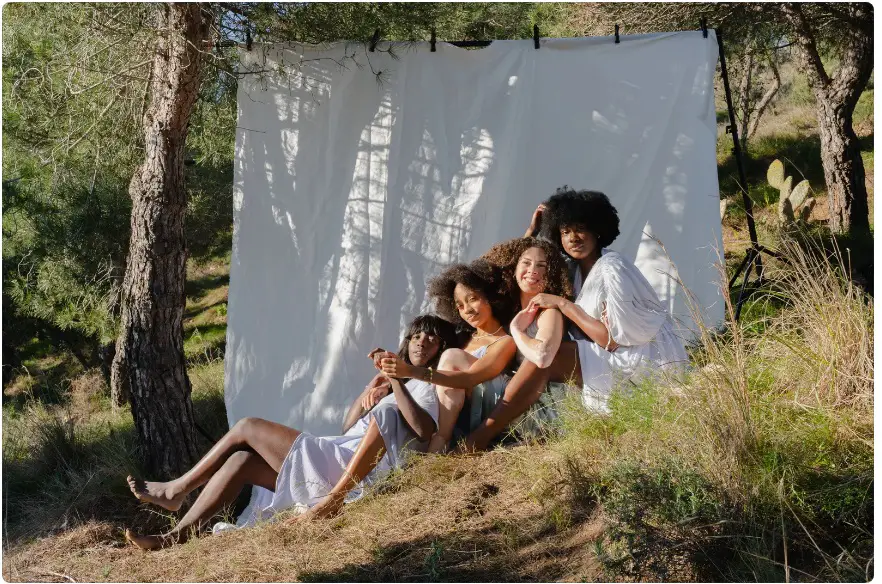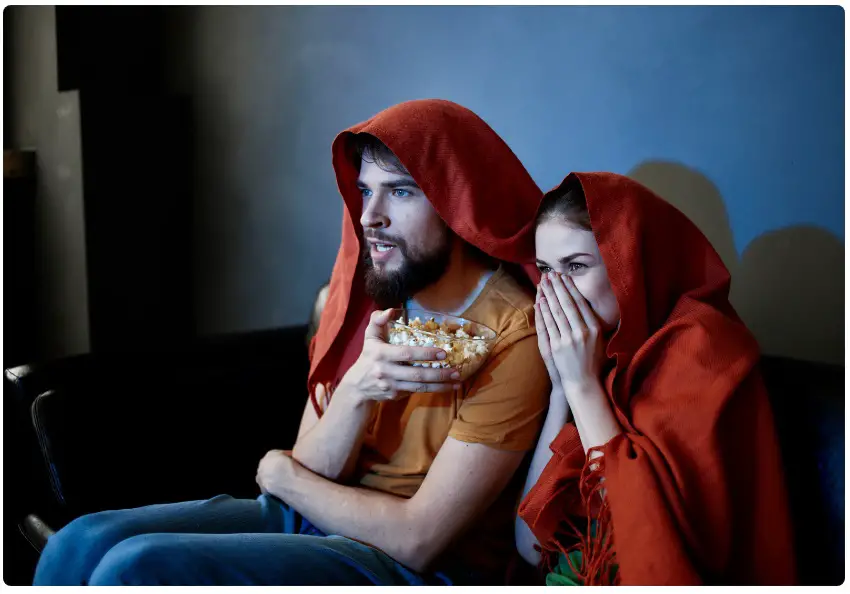Reality television has become a prominent and influential force in the entertainment industry. From dating shows such as The Bachelor, to competitive shows like Survivor, and the lives of celebrities as depicted on Keeping Up with the Kardashians, reality TV has managed to capture audiences worldwide.
The genre of reality television is defined as a type of programming that showcases real-life situations while intentionally creating dramatic moments for entertainment purposes. This differs from other types of television where writers create scripts and storylines for actors to follow.
In reality television, participants are often regular people who are thrust into a situation where they must navigate through challenges with cameras filming their every move. The popularity of reality TV shows is evident in their widespread reach across different demographics.
They have been successful in attracting viewers across various age groups and backgrounds, appealing to both genders equally. This success has also translated into financial gains, with many networks generating massive profits from advertising revenue and merchandise sales.
Contents
The Impact on Society
The rise of reality TV has had both positive and negative impacts on society. On one hand, it provides an escape from daily life by taking us into another world filled with drama and excitement.
It also serves as a platform for underrepresented individuals to showcase their skills or tell their stories. On the other hand, critics argue that reality TV reinforces negative stereotypes about certain groups such as women or people from lower socioeconomic classes.
Additionally, some worry about its effect on younger viewers who may be influenced by these shows’ behaviors. Moreover, there have been concerns raised over the ethical implications surrounding some reality TV content – including manipulation of storylines or situations for dramatic effect and psychological impact on participants who may not be equipped to handle sudden fame or backlash.
Despite these criticisms and ethical concerns surrounding this genre’s production process, it remains a popular form of entertainment that has captured the attention of millions worldwide. In the following sections, we will explore the various stages of reality TV production and highlight some of the challenges faced by production teams in producing these shows.
Pre-production
Casting process
Reality TV shows are known for their diverse casts, which include ordinary people, celebrities, and experts. However, finding the right cast members is not an easy task. It requires a meticulous casting process that involves multiple rounds of auditions.
The first round typically includes a brief interview to assess the candidate’s personality and suitability for the show. In subsequent rounds, candidates are given specific tasks or challenges to assess their skills and abilities.
The screening process also involves background checks and psychological evaluations to ensure that participants are healthy and able to handle the stress of being on camera. The producers also want to ensure that they are not putting anyone at risk of emotional or physical harm.
Concept development
Once the cast is finalized, the production team will work on developing the concept of the show. This includes deciding on the format of the show (e.g., competition-based vs. docuseries), defining the overall theme or storyline, and creating a narrative arc for each episode.
For competition shows like Survivor or The Bachelor, this means designing challenges that will test contestants’ skills while keeping them emotionally engaged with each other and viewers at home. For docuseries like Keeping Up with Kardashians or Jersey Shore, it means creating scenarios (e.g., family vacations) that bring out natural tensions and conflicts among cast members.
Location scouting
Location scouting is an essential part of pre-production for reality TV shows because it sets the stage for everything else in production. The locations need to be visually appealing while also offering enough space for filming equipment and crew activities.
The selection process often involves traveling to different cities or countries in search of ideal locations that fit within budget constraints. The location scouts also need to consider things like accessibility (for participants as well as viewers), safety concerns (e.g., avoiding dangerous areas or hazardous weather conditions), and availability of necessary permits.
Storyboarding
Storyboarding, a technique commonly used in film and television production, is also an important part of reality TV pre-production. It involves creating visual representations of each scene in the show, including camera angles and movements, lighting setups, and other technical details.
This process allows producers to plan out the entire production from start to finish before filming even begins. It helps ensure that everyone is on the same page regarding the overall vision for the show.
Budgeting
Pre-production also involves budgeting for all aspects of production. This includes everything from casting fees and location scouting expenses to camera equipment rentals and post-production costs.
Producers need to balance their creative vision with financial constraints while ensuring that they can deliver a high-quality product that will attract viewers. Experienced producers often have contingency plans in place for unexpected expenses or delays that can arise during filming.
Production
Filming Schedule and Logistics
Reality TV shows have a dynamic shooting schedule, which can be challenging to manage. The production crew must plan the filming schedules with utmost efficiency as they are dealing with competing demands from various departments. This process starts with an intricate planning phase that involves determining how long each scene might take and how to move from one location to another.
The shooting schedule is dependent on several factors like the availability of locations, cast members, equipment requirements, permits, and budgetary constraints. Any delays or unforeseeable circumstances can impact the schedule severely and might lead to additional costs.
Therefore, it is essential to create a comprehensive timeline outlining all the major events of the show’s production procedure. This includes pre-production tasks like casting and location scouting as well as post-production activities such as sound design and marketing.
Camera Crew and Equipment
To produce high-quality content for reality TV shows, it is necessary to ensure that the camera crew is equipped with professional gear that meets commercial standards. Production teams frequently invest in state-of-the-art equipment like cameras, microphones, lighting rigs, cranes, tripods among others. The camera crew must be skilled in operating advanced equipment while capturing critical moments on film.
Reality TV shows often feature multiple cameras recording simultaneously from various angles at once. As a result of this setup requirement for different types of cameras like handhelds or stationary types will need consideration based on individual scenes.
Post-production also relies heavily on quality footage that has been recorded cleanly without any technical issues. Therefore it becomes necessary for production teams to invest in high-end hardware and software solutions to ensure efficient processing during post-production procedures.
Direction & Scripting
Direction in reality tv show requires an experienced director who is familiar with working within budget parameters while still delivering a highly engaging product. Reality TV Directors must also work closely with the cast to ensure that everyone is on the same page and can create a compelling storyline.
The director must possess a refined sense of how to convey an underlying message in each scene using the available resources and on-screen talent. A well-structured script with clear direction allows for more fluidity during filming, which reduces the need for multiple takes.
Scripting, while not always necessary in reality TV shows, has taken on an increasingly critical role in modern-day productions. Over time it has become apparent that adding more structure or direction can help keep viewers engaged by adding more storytelling elements while maintaining authenticity in content creation.
Conclusion: Producing reality TV shows requires an intricate planning process that includes detailed scheduling, equipment considerations, and direction with scripting guidelines.
Production teams must work cohesively to ensure everything runs smoothly during filming. Production is one of the most important aspects, as this sets the tone for capturing premium content that will be edited throughout post-production stages to deliver a finished product suitable for viewing by millions of people worldwide.
Post-production
Reality TV shows are known for their quick turnaround times from filming to airing. This can put a lot of pressure on the post-production team to meet tight deadlines while still maintaining quality. The post-production process includes editing, sound design, music selection, and marketing and promotion.
Editing process
The editing process can make or break a reality TV show. It is in the editing room where storylines are crafted and manipulated to create drama and conflict. Editors work closely with the producers to ensure that the final product meets their vision for the show.
One of the biggest challenges in editing reality TV shows is managing large amounts of footage. Cameras are often rolling 24/7 during filming, resulting in hundreds of hours of footage that needs to be reviewed and organized.
This is where having a skilled team of researchers and loggers comes in handy. They can sift through all the footage to find key moments that will help tell the story.
Once all the footage has been logged, editors begin assembling scenes based on script outlines provided by producers. They use software like Avid or Premiere Pro to piece together different shots, add music and sound effects, and create visual effects if necessary.
Sound design and music selection
Music plays a crucial role in setting the mood for reality TV shows. It can heighten drama during confrontations or add levity during more lighthearted moments. Sound designers work closely with editors to select appropriate music tracks that enhance each scene.
In addition to selecting music tracks, sound designers also add ambient noise like crowd chatter or nature sounds to provide context for each scene. They also clean up dialogue recordings by removing unwanted background noise or enhancing certain frequencies for clarity.
Marketing and promotion
Marketing is an essential part of any successful reality TV show’s post-production process. Shows need viewership to remain profitable and relevant, so marketing teams work hard to create buzz around upcoming seasons. Marketing efforts can include creating teasers and trailers for the show, running social media campaigns, partnering with influencers for sponsored posts, and organizing press events to generate media coverage.
Promotion continues even after the show has aired. Marketing teams may create behind-the-scenes content or special features for DVD releases to keep fans engaged long after the season has ended.
Overall, post-production is a critical part of any successful reality TV show. Editors, sound designers, and marketing teams all play important roles in crafting a polished final product that captures viewers’ attention and keeps them coming back for more.
Challenges Faced by Production Teams
Reality TV shows may seem effortless and spontaneous, but behind the scenes, there are numerous challenges that production teams face. These challenges range from managing the logistics of filming to handling legal and ethical concerns properly.
Legal Issues with Participants
One of the biggest challenges that production teams face is legal issues with participants. Participants sign contracts before filming begins, outlining what they can and cannot do on the show. However, some participants may break these agreements or act in ways not intended by producers, leading to potential legal issues.
In some cases, participants may sue production companies for breach of contract or invasion of privacy if they feel that their portrayal on the show has damaged their reputation. Additionally, production companies must comply with regulations set forth by government agencies such as the Federal Trade Commission (FTC) and Federal Communications Commission (FCC).
Ethical Considerations in Editing Footage
Another challenge for production teams is navigating ethical considerations when editing footage. While reality TV shows are meant to showcase real-life situations and emotions, editing can manipulate footage to create a specific narrative or storyline.
Producers have a responsibility to ensure that they accurately represent events on screen while still creating compelling entertainment for viewers. This balance between authenticity and entertainment can be tricky to achieve.
There have been instances where reality TV show producers have manipulated footage in unethical ways that misrepresent events or situations portrayed on screen. As a result, producers must take care when editing footage so as not to mislead viewers or exploit participants.
Managing Conflicts Among Cast Members
Reality TV shows often thrive on conflict between cast members, but managing these conflicts can be difficult for production teams. Cast members may have personal issues outside of filming that spill over onto set or may develop conflicts during filming. Production teams must intervene when necessary to ensure participant safety and prevent conflicts from escalating.
Additionally, producers must ensure that conflicts are portrayed in a fair and accurate manner onscreen. Producers may implement various methods to manage conflicts, such as hiring therapists or counselors to help participants work through issues or implementing strict rules regarding behavior on set.
Production teams for reality TV shows face numerous challenges related to legal and ethical concerns, as well as managing the logistics of filming while ensuring participant safety. Producers must take great care to balance authenticity with entertainment and portray events in a fair and accurate manner on screen.
Examples of successful reality TV shows
Reality TV shows have become a popular form of entertainment across the world, and some have achieved immense success in terms of viewership and commercial revenue. In this section, we will look at three examples of such shows: Survivor, The Bachelor, and Keeping Up with the Kardashians.
Survivor: The Ultimate Reality TV Show
Survivor is a reality game show that premiered in 2000 and has since been airing on CBS. The show places a group of contestants on an isolated island where they must compete in various challenges to avoid elimination each week. The last person standing wins a million-dollar prize.
The success of Survivor can be attributed to its unique concept that combines elements of adventure, strategy, competition, and drama. Over the years, the show has evolved to include different twists and formats to keep audiences engaged.
It has also given rise to numerous spin-offs around the world. Survivor’s impact on popular culture cannot be overstated.
It introduced new jargon such as “blindside” and “alliance,” which are now commonly used in everyday language. It also paved the way for other reality competition shows like Big Brother and The Amazing Race.
The Bachelor: Finding Love on TV
The Bachelor is a dating reality show that first aired in 2002 on ABC. In each season, one eligible bachelor is introduced to 25 women who try to win his heart over several weeks of dates and challenges.
Every week, he eliminates one or more contestants until he proposes to his final choice in the season finale. Despite being criticized for its lack of authenticity and questionable gender dynamics, The Bachelor remains one of the most popular reality TV shows today.
Its formulaic structure – which includes rose ceremonies, fantasy suites, hometown visits – has become iconic enough that it is easily recognized in parodies. One of the reasons for The Bachelor’s success is its ability to capitalize on human emotion.
Viewers are invested in seeing the relationships unfold and rooting for their favorite contestants. It also creates a sense of escapism, allowing viewers to live vicariously through the participants.
Keeping Up with the Kardashians: A Glimpse of Celebrity Life
Keeping Up with the Kardashians is a reality show that premiered in 2007 on E! Network and follows the lives of the Kardashian-Jenner family members.
The show covers their personal and professional lives, including their relationships, businesses, and scandals. One reason for Keeping Up with the Kardashians’ longevity is its ability to stay relevant by changing with times.
For instance, it capitalized on social media by showing how celebrities use it to connect with fans and promote products. It also tackled sensitive issues such as mental health and body image.
Another reason for its success is its ability to create drama through conflicts among family members. The show has had several memorable moments like Kim Kardashian’s sex tape scandal, Caitlyn Jenner’s transition, and Khloé Kardashian’s cheating scandal.
These reality TV shows have demonstrated that there is no one recipe for success. Each show has its unique concept and target audiences that have helped them achieve longevity in an industry where trends come and go quickly.
Criticisms of Reality TV Shows
Reality TV shows have been highly criticized for their lack of authenticity and manipulation of storylines. Critics claim that these shows are not real and instead, they are scripted to create drama and increase ratings. This often results in situations that are far from the truth.
One common way in which reality TV shows manipulate storylines is by staging events or scenarios to create drama. For example, producers may encourage cast members to engage in arguments or to act out certain scenes in order to make the show more interesting for viewers.
This can lead to situations where cast members become overly aggressive or exhibit behaviors that they would not normally engage in. Another criticism of reality TV shows is the negative impact they can have on the mental health of participants.
Cast members who participate in these shows are often subjected to intense scrutiny from both viewers and other cast members, which can lead to a range of mental health issues. In some cases, participants have reported experiencing anxiety, depression, and other psychological distress as a result of their involvement with these programs.
Lack of Authenticity
Perhaps the most significant criticism of reality TV shows is their lack of authenticity. Many people believe that these programs do not accurately reflect real life and instead present a distorted version of reality that is designed purely for entertainment purposes.
One factor contributing to this lack of authenticity is the fact that many reality TV shows are heavily edited before they air. Producers will often cut and splice together footage from multiple shoots or take things out context in order to create a particular narrative or storyline.
Another issue with reality TV shows is their focus on drama over substance. Many programs rely heavily on conflict between cast members rather than exploring deeper issues or themes relevant to real life struggles.
Manipulation of Storylines
Another common criticism leveled against reality TV shows is their manipulation of storylines. Producers will often create scenarios or situations that are designed to generate drama and increase ratings, rather than accurately reflecting what is happening in real life. One technique commonly used in reality TV shows is selective editing.
This involves taking footage out of context or presenting it in a way that distorts the true nature of events. For example, a scene may be edited to make it appear as though one cast member is being aggressive towards another, when in reality this was not the case.
Another common manipulation technique used by producers is staging events or scenarios. This involves setting up situations for cast members to react to, which can lead to overly dramatic or contrived interactions between participants.
Negative Impact on Mental Health of Participants
The intense scrutiny and pressure associated with reality TV shows can have a profound impact on the mental health of those involved. Cast members are often subjected to public criticism and ridicule, which can take a toll on their emotional well-being. In some cases, participants have reported experiencing anxiety, depression, and other psychological distress as a result of their involvement with these programs.
This has led some critics to question whether the entertainment value provided by these shows is worth the potential harm they may cause. Furthermore, many players have struggled with post-show life after being kicked off from the show.
They could face serious financial problems due to benefits they forfeited before joining these shows. They also face struggles finding new jobs or dealing with stigmatization from media and society at large.
Conclusion
Reality TV shows have become incredibly popular over the past few decades but they are far from perfect. Critics argue that these programs lack authenticity and manipulate storylines in order to generate drama and increase ratings. Additionally, there are concerns about negative effects on mental health of participants as well as future prospects after leaving the show.
While many people continue to be drawn into watching these programs because of their entertaining nature, we must remain aware of the impact they have on individuals and society. It is important for producers to take responsibility for their actions and to ensure that participants are not exploited or put in harm’s way as a result of their involvement with these shows.
Summary of Key Points Discussed in the Article
Reality TV shows have become an integral part of popular culture and have made a significant impact on society. We explored the pre-production, production, and post-production processes involved in creating a reality TV show. In addition, we delved into some of the challenges faced by production teams such as legal issues with participants and ethical considerations in editing footage.
We also examined some of the most successful reality TV shows like Survivor, The Bachelor, and Keeping Up with the Kardashians. On the other hand, we also discussed some criticisms of reality TV shows such as lack of authenticity and manipulation of storylines that can negatively impact participants’ mental health.





